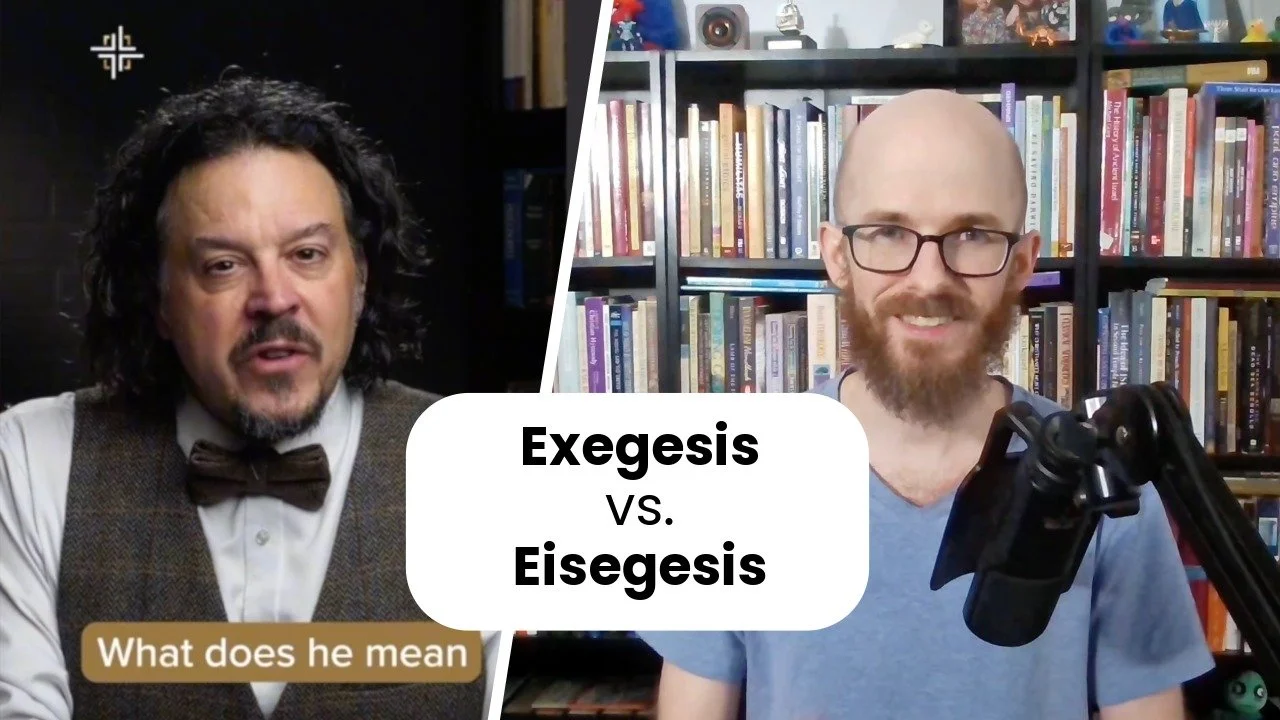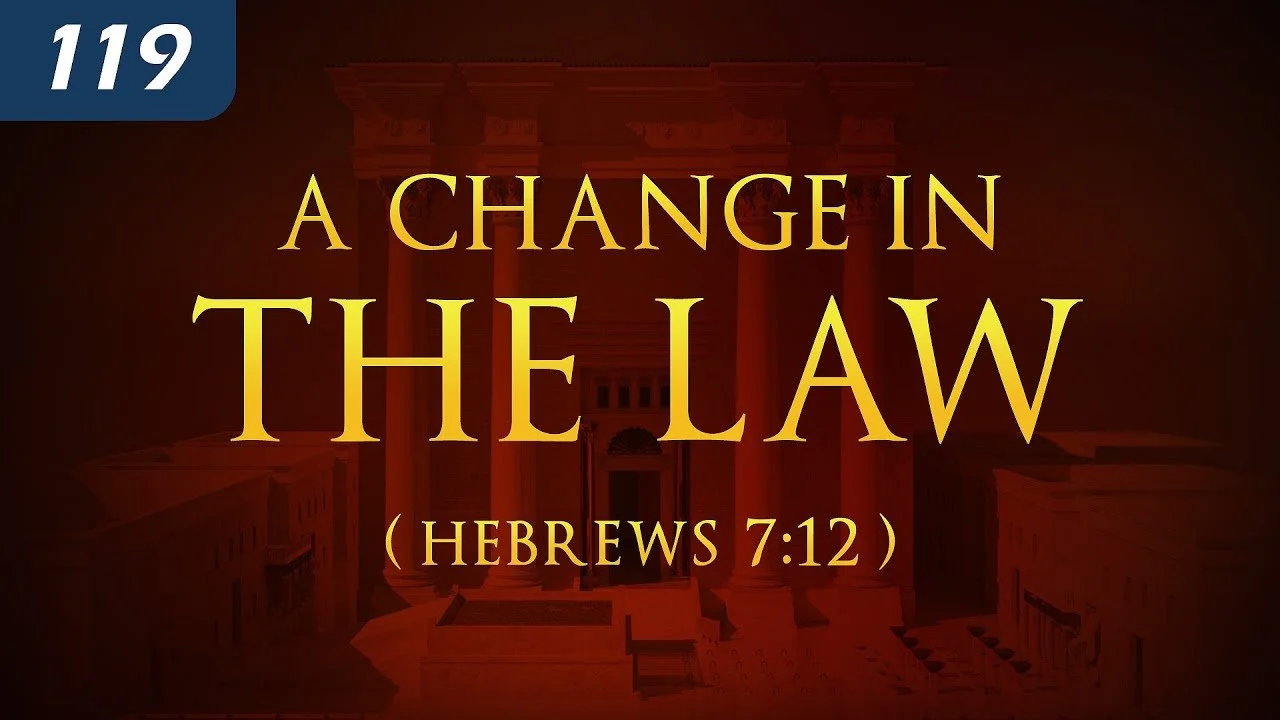Timothy Alberino is Wrong about the Son of Man in the Book of Enoch
Timothy Alberino claims that the “Son of Man” passages in the Book of Enoch are prophecies about Jesus and takes this as proof that the Book of Enoch is divinely inspired. However, there is a major problem with that idea: the Book of Enoch explicitly identifies Enoch himself—not Jesus—as the Son of Man, which directly contradicts the New Testament.
Transcript
Timothy Alberino: “Clearly, clearly the Messianic content in the Book of Enoch is, in my mind, validating its authenticity.”
Hey, thanks for the video. You say that the “Messianic content” in the Book of Enoch validates its authenticity. And by that, you mean that you think the book is inspired in some way. However, I have found that the “Messianic content” in what we call the Book of Enoch actually proves the opposite. Why? Because it directly contradicts the New Testament, specifically concerning the very identity of the Messiah. But let’s hear what you have to say.
Timothy Alberino: “Enoch employs the term Son of Man as a formal title ascribed exclusively to the Promised Messiah. Long before Jesus was born of Mary in Bethlehem, Enoch foresaw that the Son of Man would be staff to the righteous and a light of the Gentiles. The very core of Christian doctrine is revealed in the pronouncement, ‘For in his name they are saved.’ This is in the Book of Enoch written before the birth of Jesus of Nazareth. I mean, in ‘in his name they are saved.’ These are New Testament doctrines. So clearly, clearly the Messianic content in the Book of Enoch is, in my mind, validating its authenticity.”
Okay, it is true that what we know today as the Book of Enoch—specifically the Parables of Enoch (chapters 37-71)—describes a divine Messianic figure called the Son of Man. As you mentioned, according to the Book of Enoch, this Son of Man will be a light to the nations, and in his name the righteous will receive salvation. The text also states that this Messianic figure will sit on a throne of glory, judge the deeds of mankind, and receive worship from all who dwell on the earth (1 En. 45:3–6; 48:3–7; 51:1–3). These are indeed prophecies that the Hebrew Scriptures (“Old Testament”) attribute to the Messiah and that the New Testament applies to Jesus. Therefore, your argument is that the Book of Enoch must be prophesying about Jesus and, consequently, should be considered inspired—like the books contained in the Hebrew Scriptures. However, there is one major problem with that theory. The problem is that the Book of Enoch explicitly tells us who this Son of Man is. We don’t have to guess. And according to the author of the Parables of Enoch, it is not Jesus. It is Enoch.
In chapter 71, Enoch is taken to the heaven of heavens to God’s palace. There, he is greeted by God, four archangels, and innumerable other angels. And in verse 14, we see something interesting. Enoch is identified as the very Son of Man figure from the visions. Here is what it says:
And the Head of Days came with Michael and Raphael and Gabriel and Phanuel, and thousands and tens of thousands of angels without number. And he came to me and greeted me with his voice and said to me, “You (are) that Son of Man who was born for righteousness, and righteousness dwells on you, and the righteousness of the Head of Days will not forsake you.
—1 Enoch 71:13–14
As we can see, the text identifies Enoch as the Son of Man, the Messianic figure who judges the deeds of mankind and receives worship. From the perspective of the author of the Parables of Enoch, these are not prophecies about Jesus. These are prophecies about Enoch. That’s just what the text says, and I think that’s a pretty good reason why followers of Jesus should not regard the Book of Enoch as we have it today as inspired by God. It directly contradicts the New Testament regarding who the Messiah is.
Now, there are a couple of ways that someone can try to get around what the text says here. One way is to say that Enoch is being identified as a different “son of man” than the one described in the visions—in other words, that he is a son of man, but not the son of man from the earlier visions. The problem with this suggestion, however, is that in 71:14 Enoch is described in precisely the same terms as the Son of Man from the earlier passages, such as “righteousness dwelling with him” and so forth (46:3).
Another way to try to get around the text is to say that 1 Enoch 71:14 is a mistranslation. That is the approach you have taken. When I highlighted this passage to you on X (formerly Twitter), you wrote this:
“I never disputed the fact that the Ethiopic translation renders the passage that way. My contention is that it is an error, which R. H. Charles recognized and corrected. The Ge'ez translation is not perfect. The identity of the Son of Man in 1 Enoch is undisputably [sic] not Enoch.”[1]
First, I want to commend you for acknowledging that the Ethiopic text indeed identifies Enoch as the Son of Man. This is indisputable. Even R.H. Charles, who mistranslates the verse to read “this is the Son of Man,” admits in the footnotes of his translation that the text actually says “You are the Son of Man.”
As you said, your contention is that the Ethiopic text is wrong. However, the problem is that the Ethiopic text is all we have. There is no manuscript evidence anywhere that the text should say something different. Now, you appeal to R.H. Charles, but keep in mind that he also had no other text. He was working from the Ethiopic manuscripts, and he himself acknowledges that the text identifies Enoch as the Son of Man. The reason Charles chose to mistranslate the verse in 71:14, as he explains, was that he imagined that a missing passage once existed that identified the Son of Man as someone other than Enoch. The problem, of course, is that there is no evidence for a missing passage. And that is why his interpretation of 1 Enoch 71:14 has been universally rejected by scholars.[2]
In any case, with all that in mind, I have a question for you. You acknowledge that the Ethiopic text that we have identifies Enoch as the Son of Man. So, are you claiming that the Book of Enoch, as we have it today, should be regarded as inspired? Or are you suggesting that some hypothetical version of the Book of Enoch—one for which we have no evidence—should be considered inspired? If it’s the former, then why argue that a book which you admit blatantly teaches a false Messiah should be considered inspired Scripture? And if it’s the latter, how do you justify promoting a hypothetical version of the Book of Enoch that we don’t even know exists as something that should be considered inspired? Is this like a Joseph Smith and the golden plates kinda thing? I really want to know which “Book of Enoch” you are pushing here, and how you deal with this problem. Looking forward to your response!
For anyone else, if you’re interested in exploring this topic further, I highly recommend reading this paper by Dr. James VanderKam.[3] He does an excellent job of explaining how Enoch, the one narrating the visions of the Son of Man, is ultimately revealed to be the Son of Man and how that all works. VanderKam’s theory is that Enoch is seeing visions of who he will become in the future. It’s very interesting. You don’t have to agree, of course, but I think it’s worth considering. And one advantage of VanderKam’s interpretation is that it does not require changing the text or inventing hypothetical passages. He just takes the text for what it says and builds his interpretation around that.
Anyway, hope you found this video helpful. Thanks for watching, and I’ll catch you on the flip side.
[1] Timothy Alberino, X post, October 22, 2025, https://x.com/TimothyAlberino/status/1980476628766724217
[2] See George W.E. Nickelsburg & James C. VanderKam: “Charles could not imagine that this author would identify the Son of Man with Enoch. He claimed that a passage had dropped from the text that described the Son of Man accompanying the Head of Days and a conversation taking place between Enoch and an angel. Verse 14b-17, he supposed, are the remnant of the angel’s description of the function of the Son of Man, which some scribe mistakenly applied to Enoch and transposed into the second person. Charles, in turn, changed the second person pronoun in v. 14b and all the second person pronominal suffixes in vv. 14c-16 into the third person. Charles’s tour de force, however, has no foundation in the MSS. and has been universally rejected by scholars” (1 Enoch 2: A Commentary on the Book of 1 Enoch Chapter 37–82, Hermeneia [Minneapolis: Fortress Press, 2012], 328).
[3] James C. VanderKam, “Righteous One, Messiah, Chosen One, and Son of Man in 1 Enoch 37–71,” in The Messiah: Developments in Earliest Judaism and Christianity, ed. James H. Charlesworth (Minneapolis: Fortress Press, 1992), 169–91.
About David Wilber
David Wilber is an author, Bible teacher, and CEO of Pronomian Publishing LLC. He has written several books and numerous theological articles, with his work appearing in outlets such as the Christian Post and the Journal of Biblical Theology. David has spoken at churches and conferences across the nation and has served as a researcher and Bible teacher for a number of Messianic and Christian ministries…































